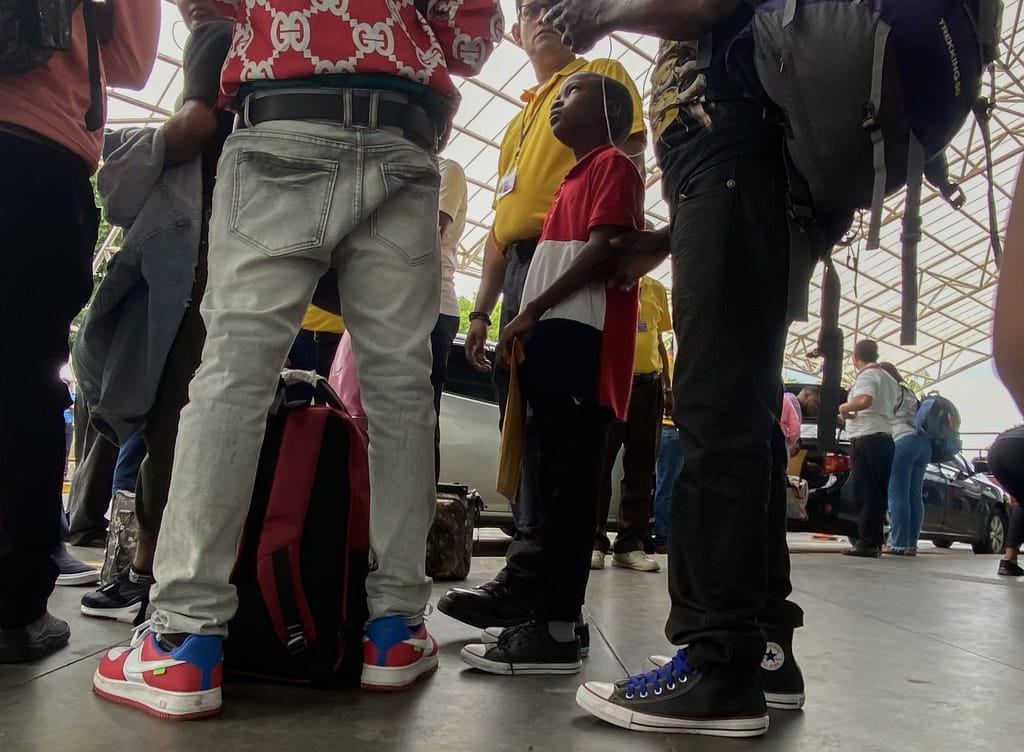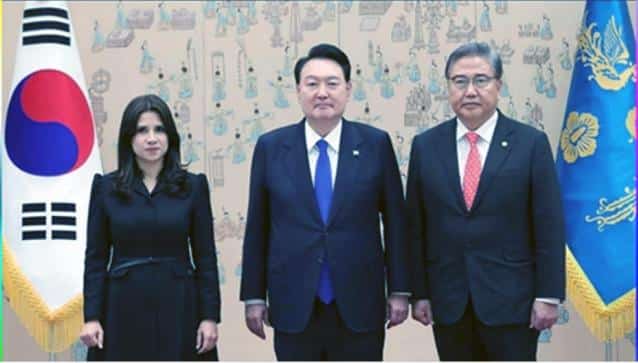29 de abril 2024

US Warns Airlines and Travel Agents About Irregular Migration from Managua

PUBLICIDAD 1M
PUBLICIDAD 4D
PUBLICIDAD 5D
The Ortega regime reportedly argued "economic issues," but opposition politicians point to a "new alignment" with North Korea

Nicaraguan Ambassador Zhenia Ruth Arce Zepeda presenting her credentials to South Korean President Yoon Suk Yeol in October 2023. | Photo: Courtesy
The Daniel Ortega-Rosario Murillo regime has decided to close Nicaragua's embassy in South Korea due to "economic issues," several Korean news agencies reported on April 24. This argument is being questioned by Nicaraguan opposition leaders, who warn of an alignment with North Korea.
The closure of the Nicaraguan diplomatic mission was confirmed by a Seoul Foreign Ministry official, who reportedly told the Korean news agency Yonhap News that "the Nicaraguan government recently informed South Korea of its decision to close its embassy in Seoul, due to the deterioration of the financial situation."
The Korea Herald also reported that a senior Foreign Ministry official confirmed the regime's decision to close Nicaragua's diplomatic mission in Seoul. "It seems that the embassy in South Korea will remain closed for the foreseeable future," he commented.
The official further clarified to The Korea Herald that a Nicaraguan ambassador stationed in a third country will handle Korean affairs concurrently to maintain diplomatic relations with South Korea.
The South Korean Embassy in Managua will continue to operate.
The Ortega regime's decision to close its embassy in South Korea contrasts with the announcement it made in July of last year, when it unveiled plans for Nicaragua and North Korea to establish embassies in each country's capital. Then in December, the regime appointed Manuel Munguía as its ambassador extraordinary and plenipotentiary to North Korea.
For opposition politician Juan Sebastián Chamorro, the regime's closing of the Nicaraguan Embassy in South Korea and the eventual opening in North Korea is a "move to align itself with the axis of evil."
"The [North] Korean dictator must have told Ortega that he could not have both embassies. Nicaragua claims financial problems, but it's opening embassies in Africa," commented Chamorro on his X account, formerly Twitter.
A similar opinion was expressed by the former Nicaraguan ambassador to the Organization of American States, Arturo McFields, who said that the Ortega regime has prioritized its relations with North Korea.
"This represents a leap into the void: greater isolation, greater poverty and greater danger in national and regional security issues," McFields stressed.
The information about the closure of the Nicaraguan Embassy was made public a day after the cancellation of the appointment of Zhenia Ruth Arce as Nicaragua's ambassador to South Korea.
The cancellation of Arce's appointment was ordered by Ortega on April 17, but was only made official on April 23, when Presidential Agreement 53-2024 was published in La Gaceta, the official register.
Arce was appointed ambassador in May of 2023 and began her official activities on July 7, when she submitted a copy of her credentials to the South Korean government. She later officially presented her credentials to South Korean President Yoon Suk Yeol on October 17.
Nicaragua and South Korea established diplomatic relations in 1962, but ties were frozen between 1979 and 1990, durings the Sandinistas' first government, and were normalized again in August 1990, after the Sandinistas had left power.
The Nicaraguan Embassy to South Korea opened its doors for the first time in 1995, during the government of Violeta Barrios de Chamorro, but closed two years later due to economic issues. The Nicaraguan diplomatic mission to Seoul reopened in 2014.
The closure of the diplomatic headquarters in South Korea brings to eight the number of Nicaraguan consulates and embassies closed in recent months. Previously, the regime closed three consulates in the United States, one in Mexico, one in Guatemala, one in England and one in Germany.
The closings of the consulates in Los Angeles, California and Houston, Texas, were announced on January 19 of this year, and a day later, the diplomatic headquarters in Tapachula, Mexico was closed. That same day, the closing of the consulate in New Orleans, Louisiana, which –according to Nicaraguan media– had not been operating for months, was made official. More recently, the closing of the consulate in Guatemala was announced.
At the beginning of February the regime announced the closings of the Nicaraguan consulates in England and Germany.
This article was published in Spanish in Confidencial and translated by our staff. To get the most relevant news from our English coverage delivered straight to your inbox, subscribe to The Dispatch.
PUBLICIDAD 3M
Confidencial es un diario digital nicaragüense, de formato multimedia, fundado por Carlos F. Chamorro en junio de 1996. Inició como un semanario impreso y hoy es un medio de referencia regional con información, análisis, entrevistas, perfiles, reportajes e investigaciones sobre Nicaragua, informando desde el exilio por la persecución política de la dictadura de Daniel Ortega y Rosario Murillo.
PUBLICIDAD 3D